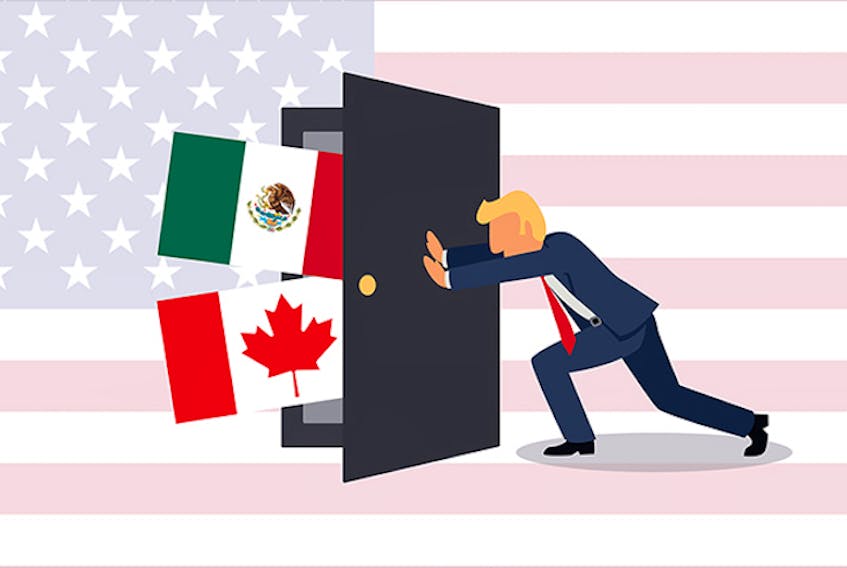BY PETER MCKENNA
GUEST OPINION
Notwithstanding conventional wisdom, it is not as easy as you might think for the United States to impose economic or trade penalties on Canada. And Canadians should keep that in mind as we confront U.S. President Donald Trump’s grudging reprieve of stiff tariffs on imported Canadian steel and aluminum.
Here is the reality in Canada-U.S. relations over the next three years: it could be Canadian steel and aluminum today and potatoes and blueberries tomorrow. Who knows what product could next be slapped with punishing U.S. tariffs? As it turns out, newsprint.
This reminds me of 35 years ago when roughly 300 protectionist-minded trade bills were pending in the U.S. Congress. It was a scary time for Canada and one of the chief reasons why Ottawa sought some protection under a bilateral free trade pact with the U.S.
Since then, our two economies have become increasingly more integrated - underpinned by well-established and lucrative supply chains. As is often said, the various parts for a North American automobile cross the Canada-U.S. border five or six times before their final completion.
In some ways, the highly integrated nature of the two economies offers Canada, in particular, a certain amount of protection or cover from U.S. contingency protection practices (e.g., countervailing duties, anti-dumping tariffs and emergency safeguard measures). Stated differently, the U.S. can’t harm the Canadian economy without simultaneously shooting itself in the foot.
We saw this problem before when U.S. President Richard Nixon imposed a 10 per cent surcharge on Canadian imports back in the early 1970s. That lasted for about three months before the Nixon White House unceremoniously scrapped the surcharge because of unrelenting international opprobrium and pressure.
While contemplating retaliatory action of its own, the Justin Trudeau government has also warned about how the Trump tariffs will disrupt commercial activity on both sides of the border. “That’s why we’re impressing upon the American administration the unacceptable nature of these proposals that are going to hurt them every bit as much as they will hurt us,” Trudeau remarked pointedly.
The big U.S. auto manufacturers, for instance, heavily depend upon Canadian steel for various parts of their finished vehicles. Trump’s tariff tantrum is only going to make those cars more expensive for U.S. consumers.
The aluminum tariff could also disrupt the Canada-U.S. Defense Production Sharing Agreement (DPSA), which covers trade in military-related equipment and armaments. Tellingly, many of the major U.S. military contractors - without any reliable source of aluminum being produced domestically - depend heavily upon imported Canadian aluminum to drive their operations.
Moreover, both Alcoa (aluminum) and Stelco (steel) are major players in these two industrial sectors - and they are owned by U.S. commercial interests. By going after them, Trump is only making life more difficult for corporate America.
Reportedly, there are roughly 140,000 jobs directly connected to steel production in the U.S. today. But there are more than 6 million jobs indirectly tied to a host of steel-related businesses from steel girders for buildings to steel wiring for concrete reinforcement. Why should the economic well-being of a few be at the expense of the many?
If it is true that the primary driver of Trump’s erratic behaviour is his obsession with placating his ever-shrinking political base, he better be careful. That same base in border states like Michigan, Ohio and Wisconsin could turn against him once it sees the economic fallout of Trump’s tariffs on the automobile, heavy truck assembly and agricultural sectors. He might not understand the basic economic implications of his most recent moves, but Trump surely gets the politics of angering his base.
Now, I’m not advocating here that Canada recklessly get itself involved in a widespread trade war with our neighbour and best customer. But neither am I suggesting that we cave into Trump’s plainly bully-boy tactics and threats of retaliation.
In the face of those threatening noises, there is no need for Canada to cower or to make any major concessions at the NAFTA bargaining table. We just need to whisper in the ears of U.S. trade negotiators that it’s never a wise move to cut-off your nose to spite your face.
- Peter McKenna is professor and chair of political science at the University of Prince Edward Island.









